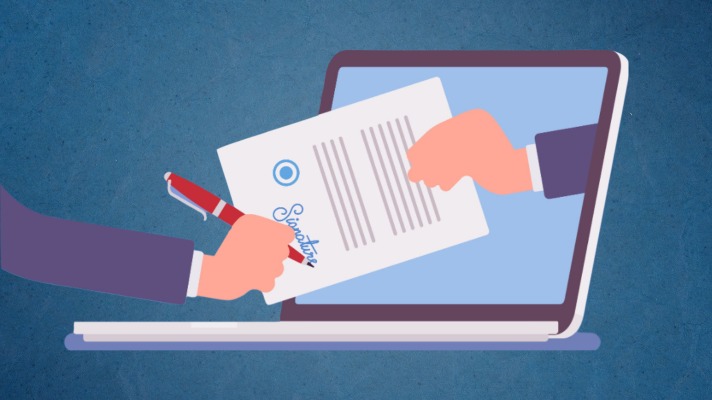Are QuoteValet eSignatures legally binding?
Electronic signatures are a normal way to conduct business transactions and sign documents. In fact, conducting business electronically speeds up your sales cycle and close deals more quickly.
eSignatures make it possible for you to send a quote or proposal to a client via QuoteValet. Your client can then sign the document no matter where they or you are. This combined with the ability to collect payment at the same time as the document acceptance saves you time and money.

Are e-signatures legally binding?
Yes. In 2000, the United States passed the ESIGN Act, making e-signatures legal for virtually any use. Similar acts have passed around the world, such as eIDAS in Europe, which make e-signatures a legal, reliable way to get important documents signed.
The Electronic Signatures in Global and National Commerce Act (E-Sign Act), was signed into law on June 30, 2000, provides a general rule of validity for electronic records and signatures for transactions in or affecting interstate or foreign commerce.
What are the requirements of the ESIGN Act?
According to the ESIGN Act of 2000, "The term 'electronic signature' means an electronic sound, symbol, or process, attached to or logically associated with a contract or other record and executed or adopted by a person with the intent to sign the record."
What's important in that definition is the phrase "with the intent to sign the record," because in order for an eSignature to be valid, a process needs to be in place to capture and retain proof that the signature was rendered with intent.
Here are the main requirements an electronic signature must meet to ensure it is legally binding:
- Intent to sign: An electronic signature is legally binding if both users demonstrate a clear intent to sign the document.
- Consent to do business electronically: Intent to sign isn’t enough on its own; both users must also demonstrate their consent to conducting business electronically.
- Association of the signature with the record: All electronic signatures must be connected to the document being signed.
- Attribution to the person signing: The software you use to collect electronic signatures must clearly indicate who signed the document.
- Record retention: U.S. laws on eSignatures and electronic transactions require that electronic signature records be capable of retention and accurate reproduction for reference by all parties or persons entitled to retain the contract or record.
Are QuoteWerks and QuoteValet compliant with the ESIGN Act?
Yes, QuoteValet documents are legally binding and UETA and ESIGN compliant. Every document signed and accepted on QuoteValet comes with an electronic record of the transaction.
What about eSignatures in other Global Regions?
The Electronic Identification and Trust Services Regulation (eIDAS) makes any type of e-signature legal and enforceable in the European Union.
Regulation (EU) No 910/2014 (the eIDAS Regulation) went into force on 1 July, 2016 having ‘direct effect’—in other words, being mandatory and wholly adopted in all EU member states, with precedent over any conflicting national laws. It replaces the eSignature Directive (1999/93/EC) and establishes an EU-wide legal framework for electronic signatures and a range of newly defined electronic “trust services”.
The eIDAS Regulation’s intent was to enable convenient and secure electronic transactions across EU borders for citizens, businesses, and public sector institutions.
Are you ready to close more deals with eSignatures? Request a demo today.
comments powered by Disqus
The views and opinions expressed on this page are those of the original authors and other contributors. These views and opinions do not necessarily represent those of Aspire Technologies, Inc. QuoteWerks is a registered trademark of Aspire Technologies, Inc. Other trademarks referenced are the property of their respective owners.
Please be advised that Aspire Technologies, Inc. is not your attorney, and this information is not legal advice. This information does not provide, does not constitute, and should not be construed as, legal advice. The information provided was accurate at the time of publishing, but may not be all encompassing. It is for educational purposes only and is not to be acted or relied upon as legal advice. The information does not constitute legal advice and is not a substitute for competent legal advice from a licensed attorney representing you in your jurisdiction.

